外研版英语九年级上册全册导学案含答案
外研版英语九年级上册全册教学设计含答案
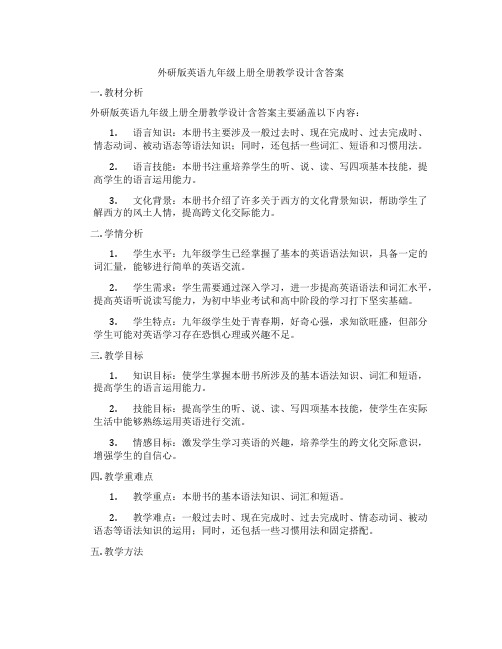
外研版英语九年级上册全册教学设计含答案一. 教材分析外研版英语九年级上册全册教学设计含答案主要涵盖以下内容:1.语言知识:本册书主要涉及一般过去时、现在完成时、过去完成时、情态动词、被动语态等语法知识;同时,还包括一些词汇、短语和习惯用法。
2.语言技能:本册书注重培养学生的听、说、读、写四项基本技能,提高学生的语言运用能力。
3.文化背景:本册书介绍了许多关于西方的文化背景知识,帮助学生了解西方的风土人情,提高跨文化交际能力。
二. 学情分析1.学生水平:九年级学生已经掌握了基本的英语语法知识,具备一定的词汇量,能够进行简单的英语交流。
2.学生需求:学生需要通过深入学习,进一步提高英语语法和词汇水平,提高英语听说读写能力,为初中毕业考试和高中阶段的学习打下坚实基础。
3.学生特点:九年级学生处于青春期,好奇心强,求知欲旺盛,但部分学生可能对英语学习存在恐惧心理或兴趣不足。
三. 教学目标1.知识目标:使学生掌握本册书所涉及的基本语法知识、词汇和短语,提高学生的语言运用能力。
2.技能目标:提高学生的听、说、读、写四项基本技能,使学生在实际生活中能够熟练运用英语进行交流。
3.情感目标:激发学生学习英语的兴趣,培养学生的跨文化交际意识,增强学生的自信心。
四. 教学重难点1.教学重点:本册书的基本语法知识、词汇和短语。
2.教学难点:一般过去时、现在完成时、过去完成时、情态动词、被动语态等语法知识的运用;同时,还包括一些习惯用法和固定搭配。
五. 教学方法1.交际法:通过情景模拟、角色扮演等方式,让学生在实际语境中运用所学知识。
2.任务型教学法:通过完成各种任务,激发学生的学习兴趣,培养学生的合作精神。
3.情境教学法:通过设定各种情境,让学生在轻松愉快的氛围中学习英语。
4.归纳法:在教学过程中,引导学生自己发现和总结语法规则,提高学生的自主学习能力。
六. 教学准备1.教学材料:教材、多媒体课件、录音机、磁带、单词卡片等。
外研社初中英语九年级上册导学案Module 1 Wonders of the world

外研社初中英语重点知识精选掌握知识点,多做练习题,基础知识很重要!外研社版初中英语和你一起共同进步学业有成!Module 1 Wonders of the worldUnit1 It’s more than 2,000 years old.【学习目标】1、(知识与技能)掌握下列重点单词及短语,句子的意思及用法:(1)Words: wonder ,discussion ,eastern, though ,loud ,opinion ,electricity(2). Phrases: join in, in one’s opinion , agree with , millions of(3). Important sentences:I’ve never seen .So I’m not sure I agree with you .That sounds great .I think …2、(过程与方法)通过本节课任务驱动,小组合作学习的学习方法,可以培养和提高学生的合作探究能力,增强合作意识,培养学生的探究精神和合作精神,培养学生的创新意识,提高学生解决实际问题的能力。
增进同学之间的了解,提高沟通交流的能力。
3、(情感、态度与价值观)培养学生对神奇大自然的热爱,对伟大的人类文明的热爱。
提高对英语的学习兴趣,提高学习英语的效率,实现语言结构与运用能力的全面转型,提高对英语的学习兴趣。
参加各种英语活动,克服困难,在新环境中进一步树立准确的语言学习观。
【重点难点】复习一般现在时,现在完成时。
【学法指导】运用观察、发现、归纳和实践等方法学习语言知识,感悟语言功能。
导 学 过 程方法导引【自主学习,基础过关】1、自主检测:课前自主拼读单词。
熟练后完成题一。
听录音,看动画,2、我的疑惑:【合作探究,释疑解惑】1.Let’s call…let sb. do sh. 让某认做某事eg: Let’s go for a walk ,shall we ?Let us go for a walk ,will you ?2.I’ve never seen it .注意现在完成时态的用法。
外研社初中英语九年级上册导学案Module 9 Great inventions
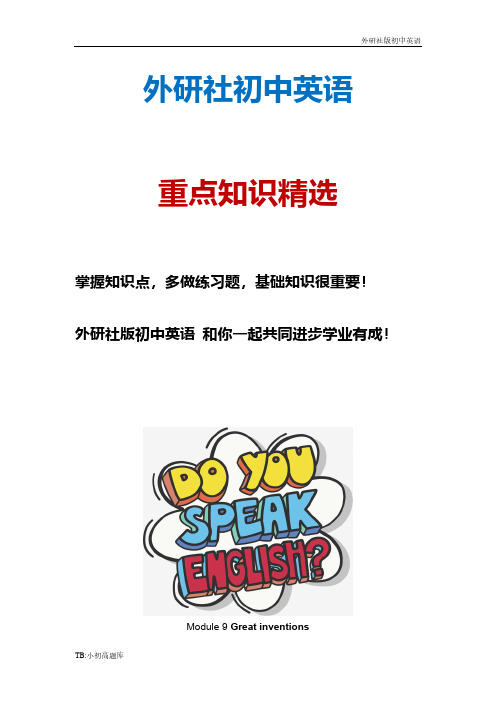
外研社初中英语重点知识精选掌握知识点,多做练习题,基础知识很重要!外研社版初中英语和你一起共同进步学业有成!Module 9 Great inventionsUnit1 Will computers be used more than books in the future?第一课时【学习目标】1、(知识与技能)掌握下列重点单词及短语,句子的意思及用法:(1).Words: borrow, website, mail, textbook, mainly, page, electronic, technology, powerful, memory, full, fix, instructions, lend, properly. (2). Phrases: put up, thousands of, hear from sb. In the future, in the past, take care of(3). Important sentences:We waited for weeks to hear from our pen friends abroad.Will computers be used more than books in the future?With the invention of the computer and electronic technology, it’s easy to get information on the Internet.2、(过程与方法)通过本节课任务驱动,小组合作学习的学习方法,可以培养和提高学生的合作探究能力,增强合作意识,培养学生的探究精神和合作精神,培养学生的创新意识,提高学生解决实际问题的能力。
增进同学之间的了解,提高沟通交流的能力。
3、(情感、态度与价值观)通过对一些重大发明的优点认识,培养自己的探索精神和创造能力。
【重点难点】一般将来时的被动语态【学法指导】运用观察、发现、归纳和实践等方法学习语言知识,感悟语言功能。
【最新】外研版九年级英语上册Module 1unit1 导学案(有答案)
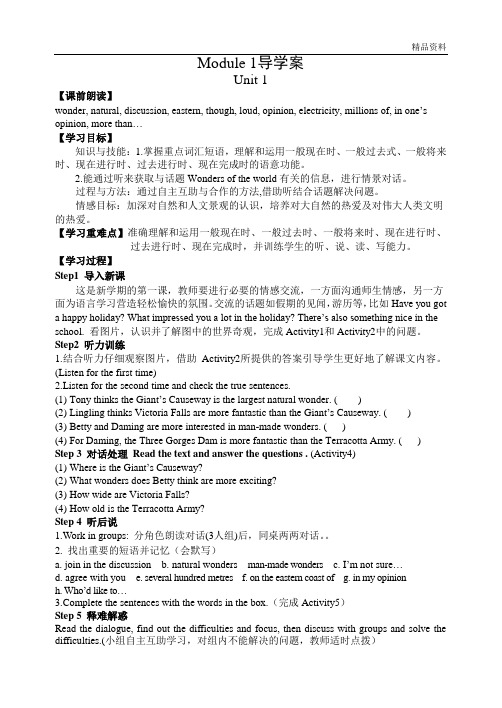
Module 1导学案Unit 1【课前朗读】wonder, natural, discussion, eastern, though, loud, opinion, electricity, millions of, in one’s opinion, more than…【学习目标】知识与技能:1.掌握重点词汇短语,理解和运用一般现在时、一般过去式、一般将来时、现在进行时、过去进行时、现在完成时的语意功能。
2.能通过听来获取与话题Wonders of the world有关的信息,进行情景对话。
过程与方法:通过自主互助与合作的方法,借助听结合话题解决问题。
情感目标:加深对自然和人文景观的认识,培养对大自然的热爱及对伟大人类文明的热爱。
【学习重难点】准确理解和运用一般现在时、一般过去时、一般将来时、现在进行时、过去进行时、现在完成时,并训练学生的听、说、读、写能力。
【学习过程】Step1 导入新课这是新学期的第一课,教师要进行必要的情感交流,一方面沟通师生情感,另一方面为语言学习营造轻松愉快的氛围。
交流的话题如假期的见闻,游历等,比如Have you got a happy holi day? What impressed you a lot in the holiday? There’s also something nice in the school. 看图片,认识并了解图中的世界奇观,完成Activity1和Activity2中的问题。
Step2 听力训练1.结合听力仔细观察图片,借助Activity2所提供的答案引导学生更好地了解课文内容。
(Listen for the first time)2.Listen for the second time and check the true sentences.(1) Tony thinks the Giant’s Causeway is the largest natural wonder. ( )(2) Lingling thinks Victoria Falls are more fantastic than the Giant’s Causeway. ( )(3) Betty and Daming are more interested in man-made wonders. ( )(4) For Daming, the Three Gorges Dam is more fantastic than the Terracotta Army. ( ) Step 3 对话处理Read the text and answer the questions . (Activity4)(1) Where is the Giant’s Causeway?(2) What wonders does Betty think are more exciting?(3) How wide are Victoria Falls?(4) How old is the Terracotta Army?Step 4 听后说1.Work in groups: 分角色朗读对话(3人组)后,同桌两两对话。
外研版九年级上册导学案
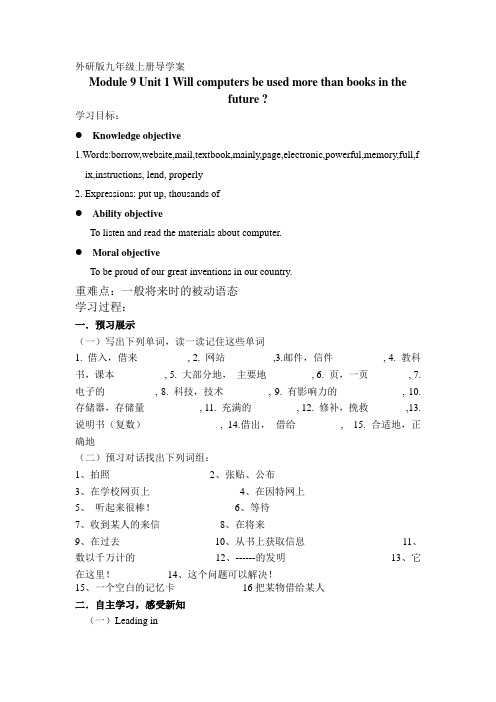
外研版九年级上册导学案Module 9 Unit 1 Will computers be used more than books in thefuture ?学习目标:●Knowledge objective1.Words:borrow,website,mail,textbook,mainly,page,electronic,powerful,memory,full,f ix,instructions, lend, properly2. Expressions: put up, thousands of●Ability objectiveTo listen and read the materials about computer.●Moral objectiveTo be proud of our great inventions in our country.重难点:一般将来时的被动语态学习过程:一.预习展示(一)写出下列单词,读一读记住这些单词1. 借入,借来_________,2. 网站________ ,3.邮件,信件__________,4. 教科书,课本__________,5. 大部分地,主要地_________,6. 页,一页________,7. 电子的__________,8. 科技,技术_________,9. 有影响力的_____________, 10. 存储器,存储量___________, 11. 充满的_________, 12. 修补,挽救_______ ,13. 说明书(复数)_______________, 14.借出,借给_________, 15. 合适地,正确地_________(二)预习对话找出下列词组:1、拍照________________2、张贴、公布_________________3、在学校网页上________________4、在因特网上_____________5、听起来很棒!______________6、等待___________________7、收到某人的来信__________ 8、在将来_____________9、在过去___________________10、从书上获取信息___________________ 11、数以千万计的_______________ 12、------的发明___________________ 13、它在这里!__________ 14、这个问题可以解决!______________15、一个空白的记忆卡_____________ 16把某物借给某人__________二.自主学习,感受新知(一)Leading in1.Do you know any inventions ?2. What are they ?3.Do you like cameras ?4.What do you use it to do ?(二)Look and sayLook at the pictures and answer the questions in pairs.1. How have these inventions changed people’s lives?2. Which one do you think is the most important?3. What other important inventions can you think of?(三)Listening1. Listen and complete the sentences.1Linging loves her mobile phone because she can ______________.2All of Daming’s friends’ numbers are _______ in his phone.3Today’s cameras are better than old cameras because they do not ________ and the photos can ______________.4Lingling thinks everything ___________ by computer to some degree, so the computer is __________________ invention.2. Listen to Part 3 and answer the following questions.1. What will Tony do on the school visit to the museum?2. Where did we get mainly information in the past?(四)Reading1. Listen to Part 3 and answer the following questions.1). What will Tony do on the school visit to the museum?2). Where did we get mainly information in the past?2. Find out the sentences which belong to the passive voice in the dialogue.1. They’ll be put up on the school website.2. And they can be seen on the Internet by other classes.3. Will computers be used more than books in the future?Scanning and finish Part3-5.Read the dialogue again and finish Part5.三.合作探究,深挖教材1. Work in pairs. Talk about the advantages of these inventions.email mobile phone TV washing machine— We can use email to send messages.— Yes, we can use email to send messages quickly and cheaply.2.Now describe how these inventions have changed your life.四、精讲精练,快速提高1 They’ll be put up on the school website.它们(照片)将被公布在学校的网站put up的意思是“张贴;公布;挂起”。
外研版九年级(上)英语导学案:m1u2

九年级英语导学案课题Module1 Unit2 The Grand Canyon was not just big. 课型Reading and writing使用时间【学习目标】1.能够读懂游记类短文获取事实性信息。
2.能够对个人熟悉的某个景观进行事实性描述且能够描写 个人的旅行经 历和感受。
【学习重点和难点】能够理解大峡谷之旅这篇文章并且知道在旅行时如何 写你所看到的和个人感受。
【学习方法】小组合作、交流讨论【Learning process 】 I.Preview1.Write the words according to the phonetic symbols. (believe in yourself, I can do it.)2..After previewingthetext, find the following phrases from the text.1.穿过2.突然向下倾斜3.在……上面;盖住4.从……出来5.在……底部6.从……上方看过去 7.看向我的左面8.眺望;向对面看Ⅱ.Cooperative learning 【Pre-reading 】Scan the passage quickly and complete the table. The Grand Canyon How deep How widephonogramword Chinese phonogram word Chinese[bi 'l əu] [skai] [ʃain] [grei] ['sail ənt] [kli ə] [sain][bi 'said] ['silv ə]['ni əli]How long【While-reading】Read the passage carefully and choose the correct answer.( )1.Where does the passage most probably come from?A. A magazineB. A grammar bookC.A dictionaryD.A storybook( )2.Why was there nothing to see ?A.Because there was nothing. C.Because it was raining.B.Because it was too dark. D.Because it was in the morning.( )3.Which direction was the writer facing while he/she was looking over the Grand Canyon?A.SouthB.NorthC.EastD.West( )4.What is the writer’s purpose in writing this passage ?A.To give facts about the natural world.B.To say how he feels about the natural world.C. To tell an interesting story about the Grand Canyon.D. To attract people to visit the Grand Canyon.【Post-listening】Complete the passage wit the words in the box.below mile remain reply sign silent sky stream throughIn the dark, there is no (1)________ of the Grand Canyon , and it is (2)________ . But if you(3)_________ by the Grand Canyon as the (4)_________ gets brighter and look down about one(5)_______ , you can the Colorado River (6)________ you. It looks like a silver (7)________ as itpasses (8)________ the rocks at the bottom of the canyon. If someone asks you whether the Grand Canyon is the greatest wonder of the natural world,it may be easy to(9) _________ .【Summary】I study, and I summarize.1.The phrases of describing the Grand Canyon :2.List framework about describing the natural or man-made wonders(activity 6 ):【Classroom consolidation】Ⅰ.Fill in the blanks with the proper form of the given word.1.I have something important (tell) you.2.We (have) a sports meeting in two weeks.3.When I got home, my mother (cook).4.The Changjiang River is (long) river in China.5.What you (do) at five o’clock yesterday afternoon? II. Complete the sentences.1.你可以清晰地看到湖底的鱼。
外研版九年级(上)英语导学案:m1u2
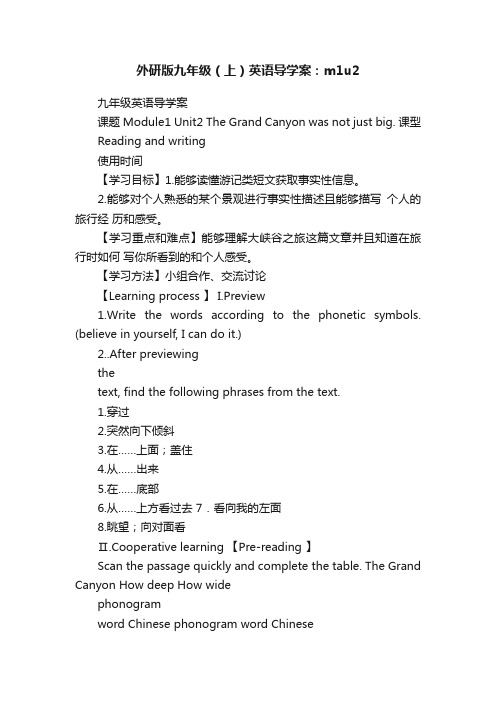
外研版九年级(上)英语导学案:m1u2九年级英语导学案课题Module1 Unit2 The Grand Canyon was not just big. 课型Reading and writing使用时间【学习目标】1.能够读懂游记类短文获取事实性信息。
2.能够对个人熟悉的某个景观进行事实性描述且能够描写个人的旅行经历和感受。
【学习重点和难点】能够理解大峡谷之旅这篇文章并且知道在旅行时如何写你所看到的和个人感受。
【学习方法】小组合作、交流讨论【Learning process 】 I.Preview1.Write the words according to the phonetic symbols. (believe in yourself, I can do it.)2..After previewingthetext, find the following phrases from the text.1.穿过2.突然向下倾斜3.在……上面;盖住4.从……出来5.在……底部6.从……上方看过去 7.看向我的左面8.眺望;向对面看Ⅱ.Cooperative learning 【Pre-reading 】Scan the passage quickly and complete the table. The Grand Canyon How deep How widephonogramword Chinese phonogram word Chinese[bi 'l ?u] [skai] [?ain] [grei] ['sail ?nt] [kli ?] [sain][bi 'said] ['silv ?]['ni ?li]How long【While-reading】Read the passage carefully and choose the correct answer.( )1.Where does the passage most probably come from?A. A magazineB. A grammar bookC.A dictionaryD.A storybook( )2.Why was there nothing to see ?A.Because there was nothing. C.Because it was raining.B.Because it was too dark. D.Because it was in the morning.( )3.Which direction was the writer facing while he/she was looking over the Grand Canyon?A.SouthB.NorthC.EastD.West( )4.What is the writer’s purpose in writing this passage ?A.To give facts about the natural world.B.To say how he feels about the natural world.C. To tell an interesting story about the Grand Canyon.D. To attract people to visit the Grand Canyon.【Post-listening】Complete the passage wit the words in the box.below mile remain reply sign silent sky stream throughIn the dark, there is no (1)________ of the Grand Canyon , and it is (2)________ . But if you(3)_________ by the Grand Canyon as the (4)_________ gets brighter and look down about one(5)_______ , you can the Colorado River (6)________ you. It looks like a silver (7)________ as itpasses (8)________ the rocks at the bottom of the canyon. If someone asks you whether the Grand Canyon is the greatest wonder of the natural world,it may be easy to(9) _________ .【Summary】I study, and I summarize.1.The phrases of describing the Grand Canyon :2.List framework about describing the natural or man-made wonders(activity 6 ):【Classroom consolidation】Ⅰ.Fill in the blanks with the proper form of the given word.1.I have something important (tell) you.2.We (have) a sports meeting in two weeks.3.When I got home, my mother (cook).4.The Changjiang River is (long) river in China.5.What you (do) at five o’clock yesterday afternoon? II. Complete the sentences.1.你可以清晰地看到湖底的鱼。
2022年外研版九上《Module 7 Great books 导学案 (附答案)

Module 7 Great booksUnit 1学习目标一、掌握本单元discuss, influence, suppose, make sense , by the way等单词和短语. 〔重点〕二、掌握并灵活运用以下句子:〔重点〕1. What’s up ?2. …but I suppose he isn’t as well-know as Confucius or Shakespeare.3. Why don’t you join in the discussion and te ll us about it ?三、听懂有关世界名著的介绍的简短对话能用不同的语态及句型介绍世界名著.自主预习根据句意及汉语提示完成单词1. We will discuss (讨论) the problem at the meeting.2. For a wise (明智的) person , time is like treasure.3. Don’t le anybody influence (影响) your decision.4. Yang Liping was well-know (众所周知)as an excellent dancer.课堂导学1. What ‘s up ? 怎么了?句型1:what’s up ? 怎么了? / 出什么事了?what’s up ? 是口语中常用的一个句式, 意为“怎么了?/出什么事了?〞相当于What’s wrong / the matter / the trouble ? 假设表示询问某人或某事, 可在句末加with sb. /sth. .Are you crying ? What’s up ? 你在哭吗怎么了What’s up with your sister ? 你妹妹怎么了即学即练一单项选择- What’s D ?- I have got a headache.A. troubleB. matterC. happenD. up解析:What’s up用于口语中, 意为“怎么了?/出什么事了?〞trouble 和matter为名词, 前面要加the; happen为动词, 应说What happened或What’s happening?. 应选D.2. But I think I’d describe Confucius more as a teacher and thinker than a writer.但是我认为与其把孔子描述成一名作家, 倒不如说他是一名教师和思想家.短语1:more … than …与其说……倒不如说……more … than …, 意为“与其说……倒不如说……〞.He is more lucky than clever .与其说他聪明倒不如说他幸运拓展:more than意为“多于, 超出〞, 相当于over常和数词连用He was ill for more than two weeks .他病了两周多了即学即练二根据汉语意思完成句子成功来自努力而不是好运.Success is more hard work than good luck.3. We’re still influenced by Confucius’s ideas , and Shakespeare’s plays also make a lot of sense to us today.我们仍然受孔子的思想的影响, 莎士比亚的戏剧到现在对我们来说也很有意义.单词1:influence影响;作用于influence作动词, 意为“影响;作用于〞, 主要指对行为、性格、观点等产生间接的或潜移默化的影响.Colors influence our moods.颜色影响我们的情绪We became best friends and he influenced me deeply.我们成了最好的朋友他深深地影响了我拓展:influenced还可作名词, 意为“影响力;作用;有影响的人或物〞. Have an influence on ….表示“对……有影响〞.Television has a strong influence on people.电视对人有很大的影响短语2:make sense 合情理;明智;有意义Make sense是固定词组, 意为“合情理;明智;有意义〞.It all started to make sense .这一切都开始变得有意义This doesn’t make sense .这一点儿都不合理即学即练三一、根据句意及汉语提示完成单词People not only in China but also from many other countries are still influenced (受影响) by Confucius’s thoughts.二、根据汉语意思完成句子这句话没什么意义.This sentence doesn’t make sense .4. By the way , what do you think of Mark Twain , the great American writer in the nineteenth century? 顺便问一下, 你认为19世纪伟大的美国作家马克·吐温怎么样?短语3:by the way顺便提一下by the way, 意为“顺便提一下〞, 常作插入语, 用于在交谈中插入新话题、题外话或评论.By the way , have you seen the film?顺便问一下, 你看过这部影片吗?归纳:与way相关的短语in the way挡路on the way… 在去……的路上in this way用这种方式in a way在某种意义上all the way自始至终!即学即练四单项选择D , do you know which bike is his?A. In the wayB. On the wayC. By wayD. By the way解析:in the way, 意为“挡路〞, on the way意为“在路上〞;C项表达错误, by the way意为“顺便说一句, 顺便问一下〞. 句意为“顺便问一下, 哪辆自行车是他的?〞应选D.Unit 2学习目标一、掌握本单元adventure, escape, run away , be surprised to do sth. , pay for 等单词和短语. 〔重点〕二、能听懂读懂评价名著的文章根据本单元学到的知识和自己的体会写一篇介绍名著作品的短文.自主预习新词自测读写单词或短语并熟记看谁记得快get into trouble2.逃走;逃跑run away3.逃离;逃脱v. escapen. cave5.死的;去世的adj. deadn. neighbouradj. aliven. dialogue课堂导学1. He and his best friend , Huck Finn , run away to a island in the middle of the Mississippi River.他和他最好的朋友哈克芬恩逃到密西西比河中游的一个岛上.短语1:run away逃走;逃跑run away是动词短语, 意为“逃走;逃跑〞. run away from …意为“从……逃走/逃跑〞when the police arrived , the thieves had run away .当警察到达时这几个小偷已经跑了He ran away form home at the age of thirteen.他十三岁那年就离家出走了即学即练一根据汉语意思完成句子警观察到小偷从银行逃跑了.The policemen watched the thief run away from the bank.2. Later , Tom escapes from a cave with another friend , Becky.后来, 汤姆和他的另一个朋友贝琪从山洞中逃脱了.单词1:escape逃离;逃脱;逃跑escape在本句中为不及物动词, 意为“逃离;逃脱;逃跑〞, 常与from/out of连用, 表示“逃离……, 从……逃跑/逃走〞.My dog escaped from/out of the cage last night.昨晚我的狗从笼子里跑出来了They escaped from /out of the city.他们逃离了这座城市拓展:escape用作及物动词, 意为“逃跑, 逃离〞, 后常接名词、代词或动名词作宾语, 不用于被动语态. You were lucky to escape the fire.你很幸运逃离了火场They were lucky to escape being punished.他们很幸运没有受惩罚即学即练二单项选择Li Ming often escape C the floorA. to cleanB. of cleaningC. cleaningD. to cleaning解析:escape作动词, 意为“逃离;逃脱;逃跑〞后跟动词时, 用动词-ing形式. 应选C.3. Everyone is surprised to see them at first , but very pleased to find that they are alive.起初, 每个人看到他们都很吃惊, 但当发现他们还活着的时候, 都很快乐.短语be surprised to do sth.为固定结构, 意为“做某事感到很吃惊〞. 其中surprise为形容词, 意为“感到吃惊的〞, 常作表语, 主语一般为人.I was surprised to see him there .我很惊讶会在那儿见到他The boy was surprised to meet his good friend in the country.这个男孩对在乡下遇到他的好朋友感到很吃惊拓展:be surprised at sth. 表示“对某事/某物吃惊〞.I am very surprised at his great progress.我对他取得的巨大进步感到非常惊讶即学即练三单项选择I had a hard time with math and I wasn’t B to get the bad report from my math teacher.A. sureB. surprisedC. excitedD. surprising解析:句意为“我学习数学很吃力,从数学老师那里得到坏的评分我一点儿都不感到惊讶. 〞根据句意可知surprised(感到吃惊的)符合题意.4. It tells how young people grow , how people love each other and how bad people pay for their actions.它讲述了年轻人如何长大, 人们如何彼此相爱, 坏人如何为他们的行为付出代价.短语3:pay for 为……付出代价pay for在本句中, 意为“为……付出代价〞. pay for还可意为“为……付款/付钱〞. pay 用作动词, 意为“付款;给……报酬〞.He will have to pay for this foolish behavior.他将不得不为这种愚蠢的行为付出代价.How much did you pay for your computer ?你买电脑花了多少钱辨析:pay , take , cost 与spend的区别He will pay 3000 yuan for his summer camp他将花300元参加夏令营It took me two hours to get there.到达那里花了我两个小时的时间That skirt cost me about twenty dollars.那条裙子花了我大约20美元I spent two hours watching the film last night.昨晚我花了两个小时的时间看电影即学即练四根据汉语意思完成句子他将不得不为自己所做的一切付出代价He’ll have to pay for what he has done.Unit 3学习目标掌握英语中常用的一般现在时的被动语态. 〔重点〕Their works are still read by many people today.It is still read and loved by people all over the world.自主预习按要求完成句子1.Jim cleans the blackboard on Wednesday.(改为被动语态)The backboard is cleaned by Jim on Wednesday2.My father doesn’t wash clothes at all.(改为被动语态)Clothes aren’t washed by my father at all.3.Trees are planted in spring .(改为一般疑问句).Are trees planted in spring?课堂导学Well, they’re all fantastic stories ,full of exciting situations of course.哦,所有的故事都很好,都充满了令人兴奋的情景.短语1:full of 装满;充满full of, 意为“装满;充满〞, be full of…, 意为“装满……的;被……充满〞, 相当于be filled with …the halls is full of people.大厅里满是人My bowl is full of rice again.= My bowl is filled with rice again.我的碗里又盛满了米饭即学即练单项选择The girl received a basket B flowers on her birthday.A. was full ofB. full ofC. was filled withD. fill with解析:be full of …与be filled with…, 意为“充满……的, 装满……的〞, 在句中构成系表结构;full of 也可表达“装满, 充满〞, 但因为没有be动词, 故常在句中作定语;fill with为动词短语, 意为“装满〞, 在句中作谓语. 而此题中已有谓语动词received. 应选B.语法规律总结一般现在时的被动语态1.英语中有两种语态:主动语态和被动语态. 主动语态中, 主语是谓语动词所表示的动作的执行者. 被动语态中, 主语是谓语动词所表示动作的承受者.Many people speak Chinese. (谓语speak的动作是由主语many people执行的, 是主动语态)Chinese is spoken by many people. (主语Chinese是谓语动词speak所表示的动作的承受者,是被动语态)被动语态由“助动词be+及物动词的过去分词〞构成. 人称、数和时态的变化是通过be 的变化表现出来的. 一般现在时的被动语态的构成为“am/is /are +及物动词的过去分词〞.Shakespeare’s plays are seen by millions of people every year .每年有上百万的人观看莎士比亚的戏剧(1)作的执行者不明确或不必说出时, 用被动语态.English is spoken all over the world.世界各地都讲英语(2)强调或突出动作的承受者时, 用被动语态Such things are only eaten by animals这样的东西只有动物才吃(3)出于礼貌或语气婉转等不愿说出动作的执行者是谁时, 用被动语态.You are requested to give another performance.请你再表演一个节目即学即练把以下句子变为被动语态1. They sing an English song before class every day .An English song is sung by them before class every day.2. My father mends the carThe car is mended by my father.Unit 1学习目标一、掌握本单元including, attend, whatever, give up等单词和短语. 〔重点〕二、掌握并灵活运用以下句子:〔重点〕1. Whatever she does , she never give up !2. That’s amazing.三、听懂有关英雄人物的对话并能流利地介绍自己喜欢的名人.自主预习新词自测读写单词或短语并熟记看谁记得快.1.包含;包括prep.2.出席;参加v.3.在国外;到国外adv.5.不管怎么样conj.7.意志;决心n. 8.获胜;胜利n.9.实在;确实adv. 10.惊人的adj.课堂导学1. Whatever she does , she never give up .无论她做什么, 她从来都不放弃.单词1:Whatever 无论什么;不管怎么样Whatever作连词, 意为“无论什么;不管怎么样〞, 在本句中引导状语从句. whatever相当于no matter what, 还可以引导主语从句, 也可引导宾语从句.happens , stay calm.不管发生什么情况, 保持镇静.归纳:类似whatever的词还有:wherever无论在哪里, however然而, whoever无论, whenever谁无论何时等. You can go wherever you like.你可以去你喜欢的任何地方Whoever comes will be welcome.不管谁来都欢迎短语1:give up放弃give up, 意为“放弃〞, 后接名词、代词或动名词作宾语. give up为动副结构的短语, 当宾语为代词时, 代词要放在短语中间.Tom isn’t good at math , but he won’t汤姆不善长数学, 但他不会放弃数学的To keep healthy , you should smoking要想保持健康, 你应该戒烟即学即练一一、单项选择- Why did your uncle finally such a good chance to work abroad?- Because he wanted to do more for our country.A. look upB. make upC. give upD. use up二、按要求完成句子改为同义句.Whatever he says , she will agree with him (改为同义句)he says , she will agree with him.2. Well, I t hink she’s a good student as well as a good player.嗯, 我认为她不仅是一名优秀的运发动, 而且还是一名好学生.短语2:as well as 也;不仅……而且……as well as, 意为“也;不仅……而且……〞, 常用来连接两个并列的成分, 强调as well as前面的内容. as well as连接两个名词、代词等作主语时, 谓语动词跟as well as前面的词在人称和数上保持一致.Bob can speak Spanish English.鲍勃不仅会讲英语, 也会说西班牙语.提示:as well as和not only…but also…同义, 但前者的语意重点和后者的语意重点恰好相反.Jennifer can sing as well as dance. 〔强调唱歌〕珍妮弗不但会跳舞, 也会唱歌.Jennifer can not only sing but also dance.〔强调跳舞〕珍妮弗不但会唱歌, 也会跳舞.即学即练二一、单项选择The mother, as well as her two daughters, to the theatre with some friends this evening.A.are goingB.were goingC.is goingD.was goingUnit 2学习目标一、掌握本单元sick, treat, manage, die for , take care of , on one’s own等单词和短语. 〔重点〕二、看懂介绍白求恩的文章并能就自己所学所知写一篇类似的短文.自主预习一、新词自测读写单词或短语并熟记, 看谁记得快.1.加拿大的;加拿大人的adj.2.士兵n.3.伤;伤口n.4.为……而死5.了解;意识到v.6. 垂死的;即将死亡的adj.7. 那时候8. 创造;创造n.9. 做成;〔尤指〕设法完成v.10. 〔使〕继续v.二、用所给词的适当形式填空1. Dr Bethune is one of the most famous (hero) in China.2. He often worked very hard without (rest) or (take) care of himself.3. Once , he managed (save) over a hundred lives.课堂导学1.Dr Bethune developed new ways of taking care of the sick.白求恩大夫开发了新方法来照顾病人.短语1:take care of照顾;护理take care of, 意为“照顾;护理〞其中care为不可数名词, 前面不用冠词修饰. 此短语后面可接名词或代词作宾语, 其同义短语为look after.She stayed at home and her mother yesterday.昨天她待在家里照顾她母亲.短语2:the+形容词某一类人或事物句中the sick, 意为“病人〞. 定冠词the与形容词连用, 表示复数意义的“某一类人或事物〞. 当这种结构作主语时, 谓语动词用复数形式.need us to care about them.盲人需要我们关心他们即学即练一一、单项选择young will like this kind of sport , but old will not.A. A;aB. A;theB.The ; aC. The ; the二、根据汉语意思完成句子当我不在家时, 照顾好你自己.When I’m out , yourself.2. At that time, there were few doctors , so he had to work very hard on his own.那时候, 那儿几乎没有医生, 所以他得努力地单独一人工作.短语3:at that time那时候at that time是固定词组, 意为“那时候〞, 常用于过去时或过去进行时的句子中.She was 86 . 那时她86岁.He was sleeping . 他那时正在睡觉短语4:on one’s own单独一人on one’s own, 意为“单独一人〞, 还可表示“靠自己;独立地〞, 一般用作状语, 相当于by oneself或者alone. Although her father is in the company , Mary got the job 尽管她父亲在这个公司里, 但玛丽是靠自己得到那份工作的.We should do our own things 我们自己的事情应该自己做.即学即练二一、单项选择- What were you doing when I called at 8 p.m. yesterday?- I the piano at that time.A. playB. is playingC. playedD. was playing二、根据汉语意思完成句子学生们应该独立完成他们的家庭作业.Students should finish their homework .3… and managed to save over a hundred lives.……设法挽救了一百多条生命.单词1:manage .做成;〔尤指〕设法完成manage作动词, 意为“做成:〔尤指〕设法完成〞, 其后可接名词、代词或动词不定式, manage to do sth.意为“设法做成某事〞. manage作动词, 还可表示“管理, 经营, 控制〞等后接名词或代词.We the work ahead of time.我们设法提前完成了工作She the shop while the owner was away.店主不在的时候她照管商店即学即练三根据汉语意思完成句子最后警察设法抓住了那个小偷.At last , the policeman the thief.4. In the end , he died of his wound.最后, 他因他的伤口〔感染〕而死.短语5:die of 因……而死, 死于……die of, 意为“因……而死. 死于……〞, 原因常来自内部, 后常接hunger, illness , cancer ,sorrow等名词. Steve jobs illness on October 5, 2021 .史蒂夫乔布斯于2021年10月5日因病逝世.Every year , nearly one million people hunger.每年约有一百万人死于饥饿.拓展:die from的用法die from, 意为“死于……〞原因常来自外部, 由环境造成〔主要指事故等方面的外部原因〕, 后常接accident , overwork , drinking , smoking等名词.即学即练四一、单项选择My grandma died cancer.Unit 3学习目标掌握原因状语从句目的状语从句和结果状语从句的用法. 〔重点〕Many people were dying because they did not get to hospital quickly enough.There were few doctors ,so he had to work very hard on his own.He wrote books so that they could about how he treated the sick.自主预习从方框中选择适当的连词完成句子1. I didn’t know which dictionary was better , I took neither.2. Traffic is heavy and the price of oil is much higher, many people go to work by bus instead.3. Both of his parents work in the city . he lives with his grandparents in the village.4. The teacher speaks loudly the students can hear her clearly.5. If you go to visit London , don’t forget your umbrella it rains a lot there .课堂导学On 12th April 1961, Gagarin took off for space .1961年4月12日,加加林乘宇宙飞船飞往太空.短语1:take off 〔飞机等〕起飞take off是动词短语, 意为“〔飞机等〕起飞〞, 反义词是land. 它还可表示“脱下;取下〞, 反义短语为put on. When will the plane ?飞机何时起飞He his raincoat and took out the key.他脱下雨衣, 拿出钥匙.注意:take off是由“动词+副词〞构成的短语, 当其后接代词时, 代词要放在take和off的中间. 当其后接名词时, 名词放在off的前后均可.Put on your clothes . Don’t take them off.把你的衣服穿上. 别脱下来.即学即练一、单项选择Attention please . The plane will in five minutes.A. take outB. take afterC. take offD. take care二、根据汉语意思完成句子这个人脱下他的毛衣, 出去了.The man his sweater and went out .语法规律总结原因、结果和目的状语从句.1.原因状语从句〔1〕because引导的原因状语从句because作连词, 意为“因为〞, 表示必然的因果关系, 语气较强, 通常放在主句之后, 假设需强调那么放在主句之前, 常用来答复疑问词why提出的问题. because引导的原因状语从句有时可与because of短语换用. because和so在一个句子中不能同时使用.I went to see a doctor because I had a cold.我去看医生, 因为我感冒了.-Why are you anxious?-为什么你很着急-Because my bike is broken.-因为我的自行车坏了.(2) since引导的原因状语从句since, 意为“因为;由于;既然〞, 侧重主句, 从句表示显然的或的理由, 常放在句首.Since we are young , we shouldn’t be afraid of making mistakes.既然我们还年轻, 我们不该害怕犯错误.2.结果状语从句so常用来连接并列句, 前一分句表示原因, 后一分句表示结果. so和since不能连用.They worked very hard , so they could finish the work before supper.他们拼命地干活, 所以在晚饭前就能把工作做完.It is very cold outside ,so I wore a heavy coat.外边很冷, 所以我穿了一件厚大衣.3.目的状语从句so that 引导的目的状语从句中通常带有can , could , may , might ,should 等情态动词. so that引导的从句在主句后, 从句前不用逗号, 有时可省略that.I will tell you all the facts so that you can judge for yourself.我会告诉你所有的事实以便你可以自己判断.即学即练用so, so that , because , because of 填空1. This meal is my treat , put your money away.2. I get up early I can do some exercise.3. I di dn’t eat the fish the smell was terrible.4. David didn’t go to school his illness.。
- 1、下载文档前请自行甄别文档内容的完整性,平台不提供额外的编辑、内容补充、找答案等附加服务。
- 2、"仅部分预览"的文档,不可在线预览部分如存在完整性等问题,可反馈申请退款(可完整预览的文档不适用该条件!)。
- 3、如文档侵犯您的权益,请联系客服反馈,我们会尽快为您处理(人工客服工作时间:9:00-18:30)。
Module 1 Wonders of the worldUnit 1学习目标一、掌握本单元though, loud, in one’s opinion, millions of等单词和短语。
二、掌握并灵活运用下列句子:1、It’s about 2,300 metres long, 185 metres high and 15 metres wide at the top.2、In my opinion, man-made wonders are more exciting than natural ones.三、听懂有关世界奇迹景观的简短对话并能利用不同时态的句型介绍世界奇迹景观。
自主预习新词自测读写单词并熟记看谁记得快1.大自然的adj.2.奇观奇迹n.3.讨论商讨n.4.看法主张n.5.虽然尽管conj.6.声音响亮的adj.7.人造的adj.8.电n.课堂导学1.That sounds great, though I think Victoria Falls in Africa are even more fantastic.它(巨人之路)听起来很神奇,但我认为非洲的维多利亚瀑布更壮观。
单词:though虽然;尽管在本句中作连词,意为“虽然;尽管”相当于although,引导让步状语从句。
though/although不能与but同时使用,但可以与yet, still连用。
she works hard at English, her English is still very weak.尽管她努力学习英语但是她的英语还是很差。
it was late, he still went on working.虽然很晚了,他仍然继续工作。
即学即练一单项选择We lost the soccer game, every one of us played very well.A. becauseB. thoughC. orD. so2.You can hear the loud noise a few kilometers away.你在几公里之外都能听到响亮的瀑布声。
单词:loud (声音)响亮的loud 作形容词,意为“(声音)响亮的”,可在句中作表语或定语I can’t stand music.我受不了喧闹的音乐。
The music was so , and it made my ears ring.音乐的声音太大了,把我耳朵震得直响。
拓展:loud 还可作副词,意为“响亮地;大声地”。
I can’t hear you clearly. Would you please say it louder?我听不清你说的话。
请你大声点儿说可以吗?辨析:loud, loudly与aloud的区别(1)loud经常用于talk, speak, laugh等动词之后,强调声音响亮。
Don’t talk so loud. You’ll wake the whole street.别那么大声说话,你快把整条街的人都吵醒了。
(2)loudly含有“喧闹”的意思,强调声音高、不悦耳,一般可以和loud互换。
The man snored loudly.这个人鼾声打得响。
(3)aloud常与read, call等动词连用,强调声音不高,但能被听见。
The English teacher stressed the importance of reading aloud.英语老师强调了大声读的重要性。
即学即练二单项选择Please read so that I can hear you.A. loudB. aloudC. loudlyD. quiet3.But in my opinion, man-made wonders are more exciting than natural ones.但在我看来,人造奇观比自然奇观更令人兴奋。
短语1:in one’s opinion 按某人的意见;在某人看来in one’s opinion意为“按某人的意见;在某人看来”,相当于sb. think(s). in one’s view是其同义短语,意为“在某人看来”,它们可以换用。
, it’s hard for our class to win the match.在琳达看来,我们班赢得这场比赛很难。
, it’s better to finish the work in two days.在他看来,最好在两天内完成这项工作。
即学即练三一、单项选择my opinion, we should go to help him.A. ForB. OnC. InD. At二、按要求完成句子In my opinion, we should change the way we study. (改为同义句), we should change the way we study.4.It’s more than 2,000 years old.它有2000多年的历史短语2:more than 多于超出more than 意为“多于;超出”,用在数词前,相当于over其反义短语为less than(少于)。
I’ve known him for twenty years.我认识他20多年了。
one person made this suggestion.不止一个人提过这个建议。
拓展:more than 还可表示“不仅”的意思,与no more than(不超过)相对。
Jason is more than a writer, he’s a sc ientist, too.贾森不仅是位作家,他也是位科学家。
He earned no more than 800 dollars a month.他一个月最多挣800美元。
即学即练四根据汉语意思完成句子这个城市人口超过一百万。
This city has a population of 1,000,000.5.It produces electricity for millions of people in China.它为成千上万的中国人发电。
短语3:millions of 成千上万的;无数的millions of 意为“成千上万的;无数的”,表示概数,后接可数名词的复数形式。
类似的短语还有:hundreds of (数以百计的)thousands of(数以千计的)等。
There are living things on the earth.地球上有数以百万计的生物。
people came to Tian’anmen Square to celebrate the National Day.数百万人来天安门广场庆祝国庆节。
拓展:million, hundred, thousand 等前有基数词时,则表示确切的数目,此时,这些词必须用单数形式,且不与of连用。
What would you do if you had a million dollars?如果你有一百万美元你将会做什么?即学即练五单项选择We all know that dinosaurs lived on the earth more than years ago.A. sixty millionB. sixty millions ofC. sixty million ofD. million ofUnit 2学习目标一、掌握本单元reply, silent, get out of …, go through等单词和短语。
二、丰富学生的知识开阔视野使学生更多地了解世界奇观。
自主预习英汉互译1.从小汽车里出来2.go through a gate3.突然向下倾斜4.a silver stream5.在……上面6.at the bottom of the canyon课堂导学1.I got out of the car, went through a gate and walked along a dark path.我下了小汽车,穿过一道门,沿着一条漆黑的道路走着。
短语1:get out of …从……出来get out of …是固定词组,意为“从……出来”,反义词组是get into …(进入……)。
The old man couldn’t the car.这位老人无法从小汽车中出来。
He the room and ran away.他从房间里出来,跑了。
短语2:go through 穿过;从头至尾地练习go through意为“穿过;从头至尾地练习”。
through是介词,意为“穿过;通过;透过”,表示动作是在某物体的空间里进行的。
We were the forest when a monkey appeared in front of us.当一只猴子出现在我们面前时,我们正从森林里穿过。
We can see glass.我们能透过玻璃看过去。
辨析:through 与across的区别through 指在立体空间中“穿过”;而across意为“横穿”指从一条线或某一物体表面的一边到另一边。
Look! The new train is running through the tunnel.看!这辆新火车正从隧道中穿过。
It’s dangerous to go across the road when traffic lights are red.红灯亮时过马路是很危险的。
即学即练一单项选择1.Last night when Tom got the car, he found his father waiting for him at the door.A. outB. out ofC. offD. in2.Don’t you think this shirt is too tight the shoulders?A. acrossB. overC. aboveD. through2.Far below me, the ground fell away and down to a river.在我下面远点儿的地方,地面突然向下倾斜到下面(深谷中)的一条河里。
短语3:fall away 突然向下倾斜;消失fall away是动词短语,意为“突然向下倾斜;消失”。
fall 的常见短语fall down to 意为“降到,落到”,相当于dropThe land and down to the sea.这片陆地向下倾斜,投入海中。
Her smile . 她的笑容消失了。
即学即练二根据汉语意思完成句子服下这个药,你所有的疼痛就会消失。
